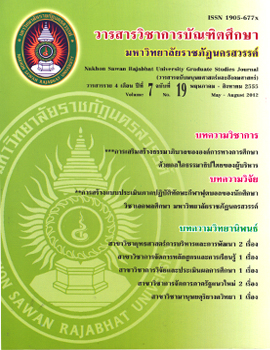การพัฒนาชุดกิจกรรมเพื่อส่งเสริมจริยธรรม สำหรับนักเรียนชั้นมัธยมศึกษาปีที่ 1
Main Article Content
Abstract
บทคัดย่อ
การวิจัยครั้งนี้มีวัตถุประสงค์หลักเพื่อพัฒนาชุดกิจกรรมเพื่อส่งเสริมจริยธรรม สำหรับนักเรียนชั้นมัธยมศึกษาปีที่ 1 การวิจัยแบ่งเป็น 3 ขั้นตอน คือ ขั้นที่ 1 สร้างและหาประสิทธิภาพชุดกิจกรรมเพื่อส่งเสริมจริยธรรม ผู้วิจัยสร้างชุดกิจกรรมเพื่อส่งเสริมจริยธรรมและนำไปทดลองใช้กับนักเรียนชั้นมัธยมศึกษาปีที่ 1 โรงเรียนชุมชนบ้านกลางนาโน สังกัดสำนักงานเขตพื้นที่การศึกษาประถมศึกษา สกลนคร เขต 3 จำนวน 17 คน ที่มีพฤติกรรมเชิงจริยธรรมไม่เหมาะสม เพื่อหาประสิทธิภาพตามเกณฑ์ 80/80 ขั้นที่ 2 ทดลองใช้ชุดกิจกรรมเพื่อส่งเสริมจริยธรรมกับนักเรียนชั้นมัธยมศึกษาปีที่ 1 ภาคเรียนที่ 2 ปีการศึกษา 2553 โรงเรียนอากาศอำนวยศึกษา สังกัดสำนักงานเขตพื้นที่การศึกษามัธยมศึกษา เขต 23 จำนวน 28 คน ขั้นที่ 3 ประเมินการใช้ชุดกิจกรรมเพื่อส่งเสริมจริยธรรมโดยนักเรียนชั้นมัธยมศึกษาปีที่ 1 ซึ่งเป็นกลุ่มเดียวกับขั้นที่ 2 และครูผู้สอน จำนวน 9 คน เครื่องมือที่ใช้ คือ แบบประเมินพฤติกรรมเชิงจริยธรรม แบบประเมินความพึงพอใจต่อการใช้ชุดกิจกรรมสำหรับนักเรียน และแบบสัมภาษณ์เกี่ยวกับความพึงพอใจของครูที่มีต่อพฤติกรรมเชิงจริยธรรมของนักเรียน สถิติที่ใช้ในการวิเคราะห์ข้อมูล ได้แก่ ร้อยละ ค่าเฉลี่ย ค่าความเบี่ยงเบนมาตรฐาน และการทดสอบค่าที (t-test dependent)
ผลการวิจัยปรากฏ ดังนี้
1. ชุดกิจกรรมเพื่อส่งเสริมจริยธรรม สำหรับนักเรียนชั้นมัธยมศึกษาปีที่ 1 มีค่าประสิทธิภาพเท่ากับ 80.51/81.55 ซึ่งเป็นไปตามเกณฑ์ที่กำหนด
2. ผลการทดลองใช้ชุดกิจกรรมเพื่อส่งเสริมจริยธรรม สำหรับนักเรียนชั้นมัธยมศึกษาปีที่ 1 พบว่า พฤติกรรมเชิงจริยธรรมทั้ง 3 ด้าน ได้แก่ ความมีระเบียบวินัย ความรับผิดชอบ และความขยันหมั่นเพียร หลังใช้ชุดกิจกรรมส่งเสริมจริยธรรมสูงกว่าก่อนใช้ชุดกิจกรรมส่งเสริมจริยธรรมอย่างมีนัยสำคัญทางสถิติที่ระดับ .01
3. นักเรียนมีความพึงพอใจต่อการใช้ชุดกิจกรรมเพื่อส่งเสริมจริยธรรม อยู่ในระดับมาก และครูส่วนใหญ่มีความพึงพอใจต่อพฤติกรรมเชิงจริยธรรมของนักเรียนซึ่งมีการเปลี่ยนแปลงไปในทางที่ดีกว่าเดิม
Abstract
The purpose of this research is the development of a learning package on activities to promote morality for Mathayom Suksa 1 students. This research are divided in to three steps: First step, constructing and finding out the efficiency of the learning package activities to promote morality. The researcher has constructed the package activities to promote morality and bring it to trial with 17 Mathayom Suksa 1 students, of the Ban Klang Nano Community School, which were under the Sakon Nakhon Primary Educational Service Area Office 3, which had wrong ethical behavior so as to find the efficiency criterion of 80/80. The second step, the experiment in using the package activities to enhance morality with 28 students of Mathayom Suksa 1, who were studying in second semester of academic year 2010 of Akat Amnuai Suksa school, under the Secondary Educational Service Area Office 23. The third step, the evaluation in using the learning package activities to promote morality by Mathayom Suksa 1 students, which were the same group of the second step, and nine teachers. The instruments of the research were a form of ethical behavior, a form to evaluate satification in using the learning package activities for students, and an interview form about the satification of teachers to ward the ethical behavior of students. The statistical data analysis were done using percentage, mean, standard deviation and t-test dependent. The result of the research were as follow:
1. The package activities to promote morality for Mathayom Suksa 1 students had efficient value of 80.51/81.55, which were with in the criterion.
2. The result of experiment the package activities to promote morality for Mathayom Suksa 1 students found that three moral behaviors which were displine, responsibility and the effort after using the package activities for moral enhancement of the students were higher than those of the pre-experiment on the statistical significant level of .01.
3. The satification of students evaluated after using the package activities to promote morality as a whole was at a high level, and most of the teachers had satification with a good moral behavior of the students, which had changed better than before.


